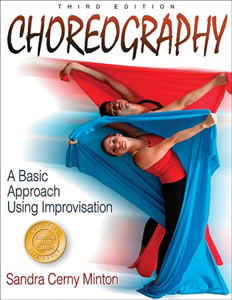 Choreography:
A Basic Approach Using Improvisation (3rd
edition) Choreography:
A Basic Approach Using Improvisation (3rd
edition)
Pub. Date:
2007
ISBN:
0736064761
Edition
Description: 176pp, paperback
Author:
Sandra Cerny Minton
Reviewer: Mary Raciborski
The purpose of this book is to provide
a formula for using improvisation to create
a dance. It is a book that would be a
wonderful resource that can be used very
effectively by anyone from dance majors
to teachers desiring to incorporate dance
into his/her program.
Not only is this book visually captivating,
it is instructionally superior. Minton
has arranged the book in a sequence that
even the non-dancer can use. She breaks
down the skills in an orderly way. She
also provides written and visual prompts,
including the proper vocabulary to use.
A glossary, references and resources,
plus an index are incorporated in the
152 pages that comprise this book. The
language flows easily from one paragraph
to the next. Each step in the creation
of the dance is clearly broken down to
a level that the projected audience can
easily understand.
One particularly important sequence found
in Chapter 1 - Exploring and Improvising
Movement - deals with solving improvisational
challenges. Mental blocks, remembering
movements, and fitting it all together
are areas that frequently stymie a choreographer.
For the new choreographer, Minton breaks
down the skills needed to overcome these
problems. For the seasoned choreographer,
she provides fresh ideas for creations,
and support for skills they may already
be using. She reminds the reader that
a dance takes shape in stages, and that
enough time is needed for the dance to
both incubate and emerge.
Minton reminds us that movement memory
can only be improved through repetition.
She gives the reader permission to understand
choreography without judging it immediately,
and to allow the form to develop naturally
in relation to what the choreographer
is planning. This is only one brief example
of the valuable information Minton provides
in her book on all areas of improvisational
choreography. She takes the mystery out
of what dance can be for choreographers
and teachers alike. By accomplishing that,
she makes dance a very doable addition
in all levels of physical education programs.
People who read this book will be amazed
that improvisation actually has an orderly
formula to follow. All too often people
feel that improvisation is just a spontaneous
act. After reading this book you will
understand why the performers who follow
a format during improvisation are so successful.
These lessons can easily transfer to any
level of teaching dance, and will be a
valuable resource for years to come. Kudos
to Minton for a job well done!
On a scale of 1-5, I award this book
a rating of 
|



